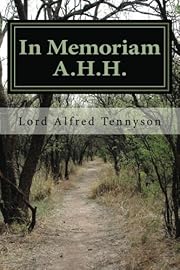

Pulse en una miniatura para ir a Google Books.
|
Cargando... In Memoriam (1850)por Alfred Lord Tennyson

A very long poem lamenting the loss of a friend and brother-in-law. I don't give ratings based on quality only enjoyment. And overall i thought this was pretty meh. There are times when it sparkles but the quality seems very uneven. I like poetry best when its telling a story or painting a picture. I understand this was written over 17 years but it feels like there was a significant gap before the final 5th, as suddenly it becomes more philosophical and the grief seems severely reduced from the first 4/5ths. The read does raise some interesting questions though. Due to its length it can come across (perhaps quite wrongly) as self-centered, being so focused on the authors grief with seemingly no thought for anyone else's. Including his sister who was married to the deceased. In fact she barely gets a mention until the end. I also wonder how much of this affection was returned. Call me cynical but in my experience love/friendship is never mutually strong. I've always had trouble processing/appreciating poetry that isn't story based (like [b: Idyll's of the King|393636|Idylls of the King|Alfred Tennyson|https://d.gr-assets.com/books/1380979896s/393636.jpg|937372] which is awesome!) and this read has none nothing to show that i've grown over the years :) . "Like Tennyson's "In Memoriam" it seems to me to be work which sprang into full flower fifty years before its time. One can hardly open a page haphazard without lighting upon some passage which illustrates the breadth of view, the felicity of phrase, and the singular power of playful but most suggestive analogy. " --Through the Magic Door, p. 256. sin reseñas | añadir una reseña
Pertenece a las series editorialesContenido enContieneAparece abreviada enTiene un comentario del texto enTiene como guía de estudio a
'Next to the Bible, In Memoriam is my comfort.' Queen Victoria's reliance, after the death of Prince Albert, on this poem by Alfred Tennyson (1809-92), Poet Laureate from 1850, epitomises its place at the heart of Victorian public and private life. The most famous poem of its age and an instant bestseller, In Memoriam was an elegy for Arthur Henry Hallam, Tennyson's closest friend, who had died young in Vienna in 1833. Its distinctive iambic tetrameter stanzas - begun days after the news reached Tennyson, and reworked for the next seventeen years - explore the nature of grief, religious consolation, and profound anxieties about man's relationship with nature, articulating the quintessential Victorian emotions of mourning and troubled faith. This reissue is of the third edition, published in 1850, the same year as the first. No se han encontrado descripciones de biblioteca. |
Debates activosNingunoCubiertas populares
 Google Books — Cargando... Google Books — Cargando...GénerosSistema Decimal Melvil (DDC)821.8Literature English & Old English literatures English poetry 1837-1899 Victorian period, 19th centuryClasificación de la Biblioteca del CongresoValoraciónPromedio: (3.92) (3.92)
¿Eres tú?Conviértete en un Autor de LibraryThing. |
||||||||||||||||||||||||||||||||||||||||||||||||||||||||||||||||||||||||||||||||||||||||||||||||||||||||||||||||||||||||||||||||||||
The sections of the poem follow a roughly chronological sequence, starting with the poet reacting to news of his friend's death and following in his imagination the progress of the ship bringing his remains back to Britain, and ending years later with the happy marriage of the poet's sister Emilia, who had been engaged to marry Arthur. Along the way he goes back and forward through different ways of dealing with grief and loss, sometimes depressed and desperate, sometimes reconciled to the idea that "'Tis better to have loved and lost / Than never to have loved at all."
And of course this is a poem full of lines that have entered the language, from "Nature red in tooth and claw" to "Ring out, wild bells". It was a huge hit in its time, and copies flew off the presses, especially after Queen Victoria announced that she had taken great consolation from it after the death of her husband in 1862. Tennyson ended up with the Laureateship and a peerage, with a standing more like that of a former prime minister than a poet.
Reading it 170 years on, of course there's a lot that feels archaic, and the endless pattern of tetrameter quatrains in ABBA rhyme-scheme can seem a bit mechanical, but there's also a lot in his insight into the way we deal with loss and death that still feels relevant and helpful: I don't suppose many people read this without thinking about the way the poet's reflections would map onto a loss in their own lives, and probably feeling better about it as a result. (